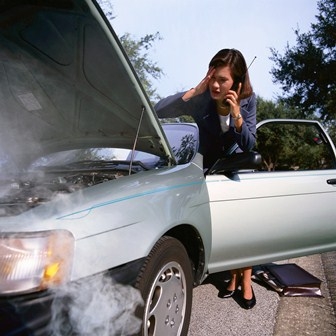How To Inspect Your Car Before Going On A Long Trip
 Interested in taking a long trip with your car or truck? It makes no difference why you travel – you need to take it through a thorough inspection. Perhaps you plan to take a long trip with your family or maybe you and your partner visit the other side of the country. The last thing you want is to end up with a wrecked truck in the middle of nowhere without phone signal – this is when the worst scenarios from horror movies cross your mind. So, what do you have to pay attention to when about to hit the road? What are the main requirements for an easy trip without any unfortunate accidents?
Interested in taking a long trip with your car or truck? It makes no difference why you travel – you need to take it through a thorough inspection. Perhaps you plan to take a long trip with your family or maybe you and your partner visit the other side of the country. The last thing you want is to end up with a wrecked truck in the middle of nowhere without phone signal – this is when the worst scenarios from horror movies cross your mind. So, what do you have to pay attention to when about to hit the road? What are the main requirements for an easy trip without any unfortunate accidents?
GPS
Unless you choose a random free route trip, using a map or a GPS becomes a main necessity. Sure, the GPS becomes irrelevant if you have already traveled to the respective place and you are familiar with the roads. A modern GPS gadget may provide real time information though, so you might get notifications about accidents, construction sites and other problems that can affect your trip. Traveling abroad? Find out what taxes and vignettes you might require. You can get a GPS as a single unit or you can just find a good application for your smartphone.
Tires
Tires represent some of the main causes of failure over long trips, so pay special attention to them. Can you see any signs of uneven wear? If you have the possibility, check the balancing system and do it again in a specialized shop. Are the tires inflated too? If one tire is over or under inflated, your car or truck will require more gas. Practically, you can kiss fuel efficiency goodbye. At the same time, the respective tire will wear faster, while maneuverability will inevitably become harder. If you can feel shaking at high speeds, tires must be rebalanced. Make sure that you have a spare tire, as well as a tire pump fitted with a manometer.
Fluids
Fluids represent the blood of your car – especially the engine oil. Not sure how to check it? Look for the gauge, pull it out when the engine is cold, clean it with a paper towel, put it back in, take it out and check the marking. The cooling fluid is not to be overlooked either, not to mention the brake and hydraulic power steering fluids. Although it is often overlooked, the windshield cleaning fluid is extremely important. You will most likely “kill” plenty of flies with your windshield, while dust inevitably kicks in. Cleaning it regularly is a must. Complete these fluids accordingly to the maximum limit. If not sure about it, reach to a shop.
Fuel injectors
Now that you are under the hood, it might be a good idea to take a peek at the fuel injectors as well. You know you have problems when the engine “chokes” at the idling speed. You should not wait until you get there though. Injectors require regular cleaning. Most dealerships will recommend replacing them, which is not so cheap. Most garages can clean them for less money, only not everyone is experienced enough. In order to prevent such problems and avoid spending a fortune, you can use specific sprays. This is a great DIY project if you are a car enthusiast. Otherwise, reach to a garage with a good reputation.
Interior filters
When about to engage into a long road trip, chances are you will spend many hours inside your truck. At this point, you want clean and fresh air inside. This rule applies both during the wintertime and the summertime. When you need the air conditioning system during a hot summer day, the necessity of a clean filter becomes even more obvious. These filters are inexpensive to replace. Sure, you can find all kinds of sprays and DIY products as well, yet they are less likely to be too durable. Instead of buying three or four sprays, you better replace a filter.
Brakes
Brakes can make the difference between life and tragedy. You do not necessarily have to replace the entire system, but do pay attention to the brake pads, especially if you have not replaced them in a year. Most commonly, they are replaced between one and two years. You know they need replacement when you hear creaking sounds as you hit the brake. Even if they feel smooth, it is still worth checking their thickness. They are inexpensive to replace anyway. Plus, this is one of the most common maintenance operations out there.
Emergency Equipment
Sure, no one wants to imagine a tragedy or an emergency when traveling. But then, unexpected situations arise when least expected. Plus, it is wiser to prevent than to treat. Emergencies are quite diversified. Maybe the weather is not good enough, so you have to spend a night inside the truck. Perhaps there is an accident on the road, so you need to wait for hours. An emergency is not always related to you. All in all, ensure that you got an updated map, a fully charged mobile phone, flares, flashlights, fire extinguishers and medical kits.
Trash and Worthless Stuff
Everyone takes the car for a storage place. It happens to anyone. Whether you leave some clothes, trash, tools or bags inside the car, you keep telling yourself that will take them out at some point or another. De-cluttering your vehicle is a main necessity before hitting the road. The heavier it is, the higher your gas consumption becomes. Get rid of all the useless junk for this trip. At the same time, do not exaggerate with the luggage either. Only pack the things that really matter, without thinking that you might use this or that.
Conclusion
In conclusion, you do not have to be an expert to properly inspect your truck before going on a long trip. Instead, this is a matter of education and attention to small details. All these things add up and can make your trip both safer and more comfortable. Overlook them and you risk facing plenty of trouble.
*Written by Nick Flame. Be safe out there.

